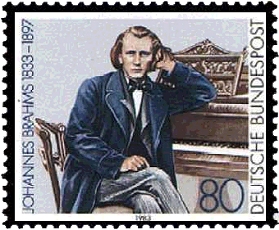|
Xtend
 Listen
Listen
 Period
Period
 Country
Country
 Notes
Notes
 Quotation
Quotation
 Projects
Projects
 Dictionary
Dictionary
 Finders
Finders
|

Born: 7 May 1833, Hamburg,
Germany
Died: 3 April 1897, Vienna, Austria
Brahms, Johannes
Born to a poor family in Hamburg,
to a father musician and a seamstress mother, Brahms
was showing signs of possessing an extraordinary talent.
Brahms left school at the age of fifteen in order to earn some money. He
studied music while supporting himself by
playing piano at bars and clubs.
at bars and clubs.
 After
settling in Vienna After
settling in Vienna ,
he established a fine reputation, both as a conductor and as a composer.
He was noticed and encouraged by Liszt ,
he established a fine reputation, both as a conductor and as a composer.
He was noticed and encouraged by Liszt and Schumann
and Schumann .
Brahms was very much in love with the latter's wife, Clara
Schumann .
Brahms was very much in love with the latter's wife, Clara
Schumann ,
who was an extremely gifted pianist herself and whose advice he always
valued. After Robert Schumann's death, however, they decided not to spend
their lives together. This fact had a significant effect on his works and
he expressed his distress in the music he wrote at the time, including
the first drafts for his First Symphony
and the exquisite "German Requiem".
That work established him as a well-known and famous composer all over
Europe. At this
time, having written only chamber works, concertos, piano music, and choral
pieces, Brahms turned to writing the four symphonies and his Symphony
no. 1 in C minor, Op. 68 was called "Beethoven's
Tenth" by a famous conductor, as Brahms saw himself continuing the
classical tradition ,
who was an extremely gifted pianist herself and whose advice he always
valued. After Robert Schumann's death, however, they decided not to spend
their lives together. This fact had a significant effect on his works and
he expressed his distress in the music he wrote at the time, including
the first drafts for his First Symphony
and the exquisite "German Requiem".
That work established him as a well-known and famous composer all over
Europe. At this
time, having written only chamber works, concertos, piano music, and choral
pieces, Brahms turned to writing the four symphonies and his Symphony
no. 1 in C minor, Op. 68 was called "Beethoven's
Tenth" by a famous conductor, as Brahms saw himself continuing the
classical tradition from the point to which Haydn
from the point to which Haydn and Beethoven
and Beethoven had brought it
had brought it . .
 Brahms
carried the standard of composition in the Classical Brahms
carried the standard of composition in the Classical style, meticulous and economizing in orchestra
style, meticulous and economizing in orchestra size, and opposed the tendency observed among
Romantic
size, and opposed the tendency observed among
Romantic composers such as Liszt
composers such as Liszt and Wagner
and Wagner toward personal, free composition in terms
of form, like the symphonic poem
toward personal, free composition in terms
of form, like the symphonic poem ,
and larger orchestras. His compositions combined
the Classical forms with the early Romanticism. ,
and larger orchestras. His compositions combined
the Classical forms with the early Romanticism.
Many of his later chamber works
are more Romantic than ever, including the charming Quintet
for Clarinet and Strings in B minor.
His influence on Mahler and Schönberg
and Schönberg was profound.
was profound.




Brahms on the WWW
 Sites
Sites
|
 Audio
Audio
|
 Video
Video
|
 Images
Images
|
 MIDI
MIDI
|
|
Description
He played

He Was

He Lived in the
 Romantic period
Romantic period
In
 Germany
Germany
|